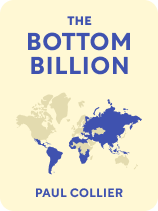

This article is an excerpt from the Shortform book guide to "The Bottom Billion" by Paul Collier. Shortform has the world's best summaries and analyses of books you should be reading.
Like this article? Sign up for a free trial here .
Do you want to know how to help poor countries? How can laws and charters improve the lives of the bottom billion?
Paul Collier, a British economist, believes that one of the most cost-effective ways to help the poorest countries is to change their laws. It sounds harsh, but by creating a more ethical system, the economy can start to grow.
Here’s Collier’s method for helping the bottom billion.
Laws and Charters
Collier argues that his poverty remedy—changes to laws and international norms—is the most cost-effective method if you want to know how to help poor countries. Both laws and charters can improve growth by requiring or incentivizing poor nations’ governments to be more ethical and transparent.
Western Laws
Collier says Western nations can change their own banking laws and regulations to reduce bottom billion corruption in two ways:
First, they can require reporting of suspicious or corrupt transactions from abroad to authorities. The West already does this with transactions tied to terrorism. It can expand to include corrupt bottom-billion money.
Second, they can enforce the laws against bribing foreign officials, which have usually been overlooked.
(Shortform note: Only in 1997 did the Organisation for Economic Co-operation and Development (OECD) require its member nations to make bribing a foreign official illegal. In fact, Western contractors are notorious for bribing foreign governments to secure contracts.)
International Charters
International charters can help economic growth by providing a roadmap for proper conduct and prudent policy. While they’re not enforceable by law, Collier argues charters use peer pressure to improve behavior. Collier identifies five areas where establishing norms via international charters, or voluntary pacts among nations, can be effective.
Natural resource revenues: This might include competitive bidding for contracts, transparency in spending funds, and spreading some of the risks of price shocks to companies rather than governments through negotiated contracts and insurance policies.
Democratic norms: Collier suggests emphasizing a free press, since this has been shown to substantially reduce government waste, fraud, and abuse.
Budget transparency: Publishing how government revenue is spent, and the results of those expenditures, is crucial to accountability.
Peacekeeping: This charter would lay out standards for international security efforts and foreign aid.
Investment: A charter on investment would make rules for adjudicating disputes between governments and investors, as well as include a mechanism for investor insurance.
| Amnesty International on Fighting Corruption Amnesty International, an organization devoted to exposing and fighting corruption, has an annual Corruption Perceptions Index, which ranks countries on their levels of corruption. Unsurprisingly, the worst performers on the index are mostly bottom billion nations. Similar to Collier’s idea of voluntary charters, Amnesty International advocates for “Integrity Pacts” to improve transparency and accountability. Contractors, bidders, and a third-party watchdog sign the pact to adhere to specified standards in the procurement process. Additionally, Amnesty International has devised a set of strategies for cracking down on the West’s complicity in paying bribes to secure government contracts: Develop protections for whistleblowers and public registers that reveal the owners of foreign assets.Strengthen criminal liability for companies committing bribery.Ensure transparency in foreign bribery settlements, and compensate the victims. |

———End of Preview———
Like what you just read? Read the rest of the world's best book summary and analysis of Paul Collier's "The Bottom Billion" at Shortform .
Here's what you'll find in our full The Bottom Billion summary :
- How development aid programs pay too little attention to struggling countries
- A look at the four poverty traps, and the four remedies for them
- How conditions for the bottom billion are changing






